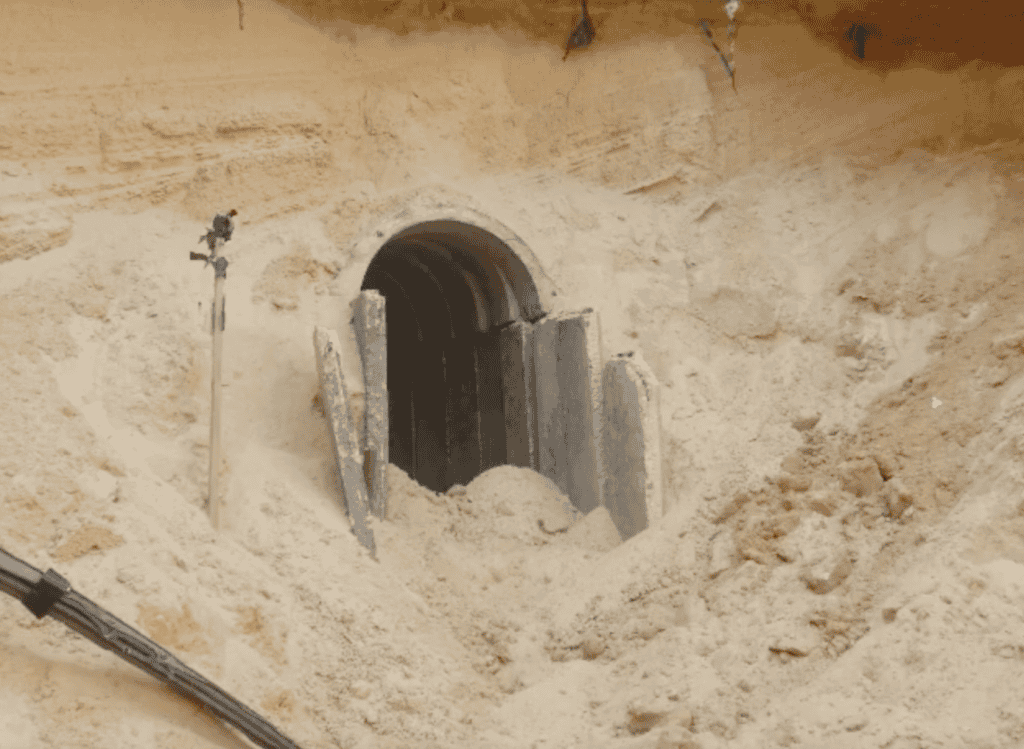
The Israel Defense Forces announced on January 5 that one of its brigades working with an elite combat engineering unit had discovered seven tunnel shafts at a beach resort in Gaza. The resort was deserted following the October 7 attack on Israel by Hamas and Israel’s subsequent ground operations in Gaza which began on October 27. However, the discovery of the tunnels is one of several recent announcements by the IDF that illustrates the long and complex task of uprooting terrorist infrastructure in Gaza.
The process of finding tunnels and other terrorist sites in Gaza has gone on since Israeli forces first entered neighborhoods in northern Gaza in early November. It took more than a month to fully defeat the dozen Hamas battalions that were in northern Gaza. This has left IDF units in control of some neighborhoods on all sides of Gaza City, and also enabled them to focus on finding tunnels and weapons storage sites, rather than fighting the Hamas terrorists who were in these areas. This also occurred against the backdrop of Israel shifting to a new phase of operations in Gaza, one that is less intense than the ground fighting in November and December 2023.
The Blue Beach Hotel is along the Mediterranean coast in Gaza, one of several resorts and hotels to dot the coastline. The IDF said on January 5 that the Yahalom elite combat engineers located the tunnel routes and then destroyed them. “Hamas terrorists exploited the hotel as a shelter from where they planned and executed attacks both above and below ground. Many weapons were found under the hotel, including AK-47 assault rifles, explosives, and drones,” the IDF said.
In another area in central Gaza amidst a number of high-rise buildings, the IDF said they found “sites for launching anti-tank and anti-aircraft missiles at IDF forces. Loaded rocket launchers, buildings rigged with explosives, tunnel shafts, and numerous explosives were found in the area. During combat in the area, forces eliminated terrorists and located and destroyed many [tunnel] shafts.”
Last week, the IDF’s elite naval commando Shayetet 13 unit conducted a targeted raid on a Hamas site in the central Gaza Strip. “During the raid, the forces identified several tunnel shafts leading to a network of hundreds of meters of Hamas terror tunnels. Additionally, during the searches, the soldiers found a weapons cache which included mortars, grenades, and RPG missiles,” the report said. The IDF released the details of the raid on January 4. The forces found tunnel shafts after the raid.
Another high-profile site in Gaza is Shifa hospital, the largest medical compound in the Gaza Strip. Israeli forces concentrated on eliminating terrorists near the hospital in November. The IDF then revealed on January 3 that a tunnel excavated on November 24 was subsequently dismantled by combat engineers. “During the activity to dismantle these expansive underground tunnels, the hospital building above ground was not damaged and humanitarian activities in the hospital were able to continue,” the IDF said.
Taken together, the numerous reports about finding tunnels and terrorist infrastructure illustrate how the new phase of lower intensity combat in parts of Gaza is giving way to a focus on sweeping areas for these tunnels and completing efforts that began in November.
There are still threats to IDF forces, particularly in Khan Yunis and areas in central Gaza. In Bureij on January 5, terrorists tried to attack an IDF tank. An Israeli UAV monitored the threat and an warplane struck the terror cell. Meanwhile in Khan Yunis, the IDF found launch pads used to fire rockets at Israel. Hamas rocket fire against Israel continues to decline. The IDF said that it carried out strikes on 100 targets between January 4 and 5, which appeared to be a slight uptick from strikes over the last week.
Several brigades of IDF reservists have now left Gaza, in a reduction in forces after ninety days of fighting. With the units back in Israel, Israel’s Southern Command has begun a forum for the reserve commanders to discuss lessons learned. In addition, in the evening on January 5, IDF spokesperson Rear Admiral Daniel Hagari said, “our goal is to constantly improve, to learn lessons from the fighting, extending our achievements and minimizing casualties to our forces.”







